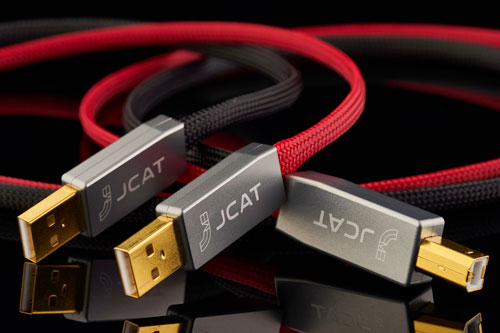The designers of the Swiss Cables obviously have a clear understanding of the long history of cable design, especially about what worked exceedingly well and why. The inner structure of their products reminds me a little of the fabled Western Electric cables of yore and some principles found in their design.
But the Swiss are far from having simply repackaged a role of Western Electric wires in a new shell. Actually, their cables are a blank sheet design, starting from scratch. As designers for their cables, Swiss Cables has commissioned Lumen White Research in Switzerland, a company known, between others, for their ingenious loudspeakers designs.
In the early 70s, Pierre Johannet of the French National Institute for Electric Research published an article in the French High End magazine “L’Audiophile” on his research surrounding MDI, signal distortions in cables caused by electrical micro-discharges at the conductor-dielectric junction. MDI distortions occur predominantly in the presence of synthetic polymer dielectrics, the very materials which practically dominate modern audio cable design! While the engineers at Western Electric did not know about MDIs yet, they used natural insulators like cotton and silk for their cables, as synthetic polymers were not yet available. 

-
JCAT Reference USB Cable
Anfang dieses Jahres hatte ich im Rahmen meiner Beschäftigung mit dem Player JPLAY auch das JCAT USB Kabel ausprobiert und war von dessen klanglichen Qualitäten sehr angetan. Das JCAT Reference USB Kabel soll in klanglicher Hinsicht noch einmal eine deutliche Verbesserung bringen. Nachdem ein Testexemplar dieses Kabels zum damaligen Zeitpunkt nicht verfügbar war, kamen Marcin Ostapowicz, einer der beiden Köpfe von JPLAY und JCAT, und ich überein, einen Test dieses Kabels zu einem späteren Zeitpunkt…09.12.2016 -
Swisscables Reference Plus (LS)
Swisscables, die dritte: Die Reference-Serie der Swisscables haben Jürgen Saile und ich gemeinsam vorgestellt um zu zeigen, wie sie sich in Ketten mit „normalem“ und hohem Wirkungsgrad verhalten. Die neue Top-Version der Netzkabel präsentierte kürzlich der Kollege, während ich mich hier um die Plus-Version der Lautsprecherkabel kümmere, worauf des Zusatz „(LS)“ im Titel hinweisen soll Bevor ich mich näher mit den neuen Swisscables beschäftigte, habe ich mir noch einmal kurz den Test angesehen, den Jürgen…06.07.2015 -
Swisscables Reference Plus
Wie der Name schon vermuten lässt, stammen die Swisscables aus unserem Nachbarland Schweiz. Dabei bin ich immer wieder überrascht, wie viele innovative Highend Produkte aus dem vergleichsweise kleinen Land kommen Diesmal also Kabel. Nun wird der eine oder andere vielleicht denken: Was soll der Quatsch? Mein Toaster funktioniert auch ohne Highend-Strippe einwandfrei. Und ob der dann mit so einem Kabel einen besseren Toast macht, möchte ich erst einmal sehen. So. Zu diesem speziellen Thema kann…11.05.2015 -
TEAC Reference HA-501 Kopfhörerverstärker
Es regnet, in der Ferne grollt ganz ohne Membranen erzeugtes göttliches Bassgewitter. Warren Haynes stimmt „Blue Radio“ an, der Nachmittag verspricht unterhaltsam zu werden... Schon die ersten Gitarrenriffs von Mr. Haynes offenbaren die Ambitionen des Kopfhörerverstärkers aus dem Hause TEAC, er möchte ganz vorne mitspielen. Ein Anspruch, den auch die anderen Mitglieder der jüngst eingeführten Reference 501 Serie schon im Namen tragen. Neben dem Testgerät und dem bereits von uns erprobten Vollverstärker mit Wandler AI-501DA …11.10.2013 -
Swiss Cables Reference
Was wurde nicht schon alles über Kabel geschrieben und jetzt kommen wir auch noch mit diesem Thema daher! Irgendwie sind viele Leser skeptisch bei Kabeln, die mehr als fünf Euro pro Meter kosten und argwöhnen Betrug. Und die Preisgestaltung bei manchen Edelstrippen ist auch für den gesunden Menschenverstand mitunter schwer zu verstehen. Trotzdem wäre es schon fast fahrlässig für ein HiFi Magazin, Sie nicht über die Qualitäten der Swiss Cables zu informieren. Die Schweizer haben…17.01.2014
© 2025 | HIFISTATEMENT | netmagazine | Alle Rechte vorbehalten | Impressum | Datenschutz

























 |
|





















































































